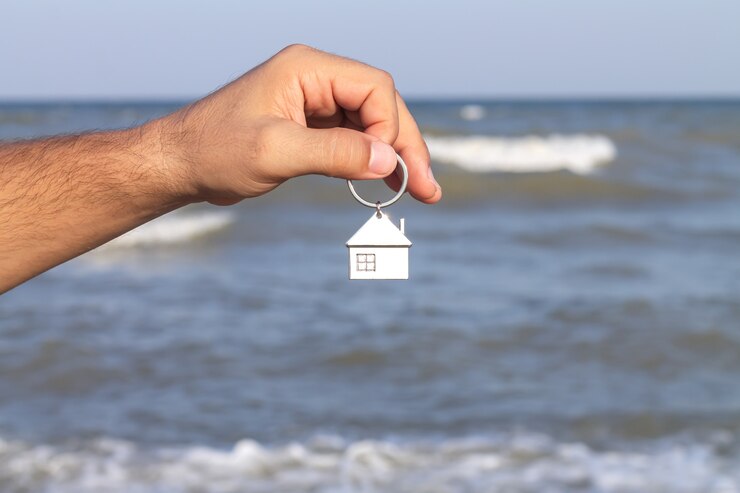Investing in beachfront properties not only lowers stress levels and increases physical activity, but also tends to result in a high return on investment. Are you considering a house by the ocean?
Before buying a beach home there are some essential things to consider. These range from budget concerns and flooding prevention. It’s important to get all the facts before investing in your dream beach house.
In this article, we’ll give you the valuable information you need to make an informed decision. This includes how to avoid common pitfalls like water damage and oceanfront access, so keep reading.
Benefits Of Buying A House By The Ocean
One of the major benefits of buying a house near the ocean is convenience. You can enjoy all the beauty and relaxation that comes with living by the sea without having to drive there for a day trip. Plus, you get easy access to beaches, fishing spots, boating activities, and more.
Additionally, beachfront properties tend to increase in value over time, making them a great long-term investment. This is due to their limited availability and high demand.
On top of the financial benefits, living near the ocean can improve your physical and mental health. People who live by the beach enjoy better air quality and higher levels of Vitamin D from natural sunlight exposure. All this adds up to an overall improved sense of well-being.
It’s easy to understand why so many people are considering buying a house by the ocean. Before you do, however, there are some important factors to consider.
Things To Consider When Buying A Beach House
There are many factors to consider when buying a beachfront home, but with proper research, you can rest assured that your investment will be a sound one. Don’t forget to consult with local real estate agents to get a better understanding of what to look for.

We’ve listed below the key things to keep in mind when buying a beach property.
1. Location of the Property
Be sure to do your research on the location of the property. Are you intending on using your property for short weekend breaks, extended stays, or a permanent place to live?
Also, consider what’s around the area. Are there shops or restaurants close by? Is the beach within walking distance?
If it’s in an area that is prone to flooding or hurricanes, you may want to consider a different location. It’s also important to make sure that the home is as close to the beach as possible so you can maximize its value and enjoy all of its benefits.
2. The Condition of the Property
It’s important to make sure that any house you buy is structurally sound and free from major flaws. Check for signs of wear and tear, dampness, issues with electrics, and other defects.
If you’re looking to make improvements, consider the cost and time that will be required. It may be worth getting an inspector out to assess any potential issues before you commit to a purchase.
It’s also important to check If the property has been well maintained and has all necessary legal paperwork in order.
3. Construction And Foundations
If you’re buying a property along the coast, making sure it can withstand severe weather should be your top priority. This will help protect your investment from potential damage.
To reduce the risk of flood damage and storm surge, it’s recommended to buy a beach house that’s built on stilts and made of wind and flood-resistant materials. Additionally, ensure the materials are strong enough to withstand heavy rain and high temperatures.
For coastal homes, the most suitable building materials are usually concrete and naturally durable wood. Compared to most wood houses, concrete is considered the most robust and durable material for beach homes. It is capable of enduring the impact of high winds and heavy rain.
4. Identifying Potential Flood Risks
Before you purchase a beach property, it’s important to investigate the likelihood of flooding. Check if the area is prone to high tides and other storm events that can cause damage. Also, check if there is any flooding prevention.
You should double-check with local authorities about any flood control measures they may have put in place, such as levees or barriers. This can help give you peace of mind that your new beach property is safe. With flood prevention in place, it will also give you the benefit of finding cheap flood insurance compared to a property where there is none.
5. Use A Coastal Home Inspector
It’s important to make sure you use an inspector who is familiar with the area you’re purchasing. They should also have experience working with coastal properties. Using an inspector who lacks this expertise can lead to significant issues in the future.
A beach home comes with its own set of challenges due to the harsh environment. An inspector from the city or a different region may not be familiar with the specific issues of a beach home.
The salty air, wind-driven water, and sand can corrode the galvanized joist hangers in decks and flashing on buildings. While a coat of paint may mask some of these problems, a coastal inspector will thoroughly examine for any potential unseen hazards that may be caused by the seaside conditions.
6. Costs Involved With Buying A Beach Property
In addition to the purchase price, you should also consider the costs involved in owning a beach property. These can include taxes, insurance premiums, maintenance, and repairs.
Your beach home budget should factor in these additional expenses so you can ensure that you will be able to afford them over time.
It’s also important to think about what kind of income you can generate from renting the property out while you’re not using it. This could help to offset any costs associated with owning a beach home.
7. Understanding Oceanfront Access Regulations
Another consideration is to look into any regulations surrounding oceanfront access. Depending on where your beach home is located, there may be restrictions on how close you can build. There may also be rules on how much of the beachfront you have access to.
You should research any potential regulations in the area before committing to purchase so you know exactly what you’re getting into.
8. Knowing The Local Weather Patterns
It’s useful to understand the local weather patterns and potential hazards. Check with the National Weather Service for any advisories or warnings in the area. These could impact your beach home.
Look up current information on high tides and other storm events that can cause damage. Being aware of these potential dangers will help you prepare for them before they become a problem.
9. Flood Insurance For Your Beach Home
If you’re buying a beach home in an area prone to flooding, it’s important to look into flood insurance. This type of coverage is separate from your home insurance and can protect your property against damage due to floods.
Be sure to read the fine print of any insurance policy you’re considering. It’s important to understand exactly what is covered and what isn’t. This will help you determine the right amount of coverage for your property.
10. Investigating Local Wildlife And Ecosystems
It’s also important to look into any local wildlife and ecosystems in the area. Knowing about the local flora and fauna can help you plan your activities so as not to disrupt the natural balance of the environment.
You should also research any potential dangers posed by wild animals or plants. Many beach homes are located close to wetlands or other areas where there may be either protected or dangerous wildlife. Knowing how to handle these situations safely is important for your safety and the safety of the animals.
11. Evaluate The Views And Amenities
It’s important to evaluate the views and amenities.
Does the property have panoramic ocean views? Is there easy access to a beach? How about nearby restaurants or shopping centers?
The proximity of amenities will affect the value of your property. It’s also about checking any local future planning. If you’re after a tranquil location and a big shopping mall is going through the planning stages, you may want to reconsider your location.
12. Understand HOA Fees
In certain towns, neighborhoods near the beach may be managed by homeowners associations (HOAs). It’s important for buyers to be aware of this and take it into consideration before purchasing.
These fees can accumulate over time. If your residence is located within an HOA community, you are obligated to pay their standard fees for all services.
Considering A House By The Ocean?
If you’re considering purchasing a house by the ocean, there are many factors to consider before buying. From flood risks to amenities and fees, it’s important to do your research.
This list of things to keep in mind will help you feel confident about finding your dream home! For more helpful articles like this one on buying real estate, make sure to check out our blog for useful information.
Read Also:




























